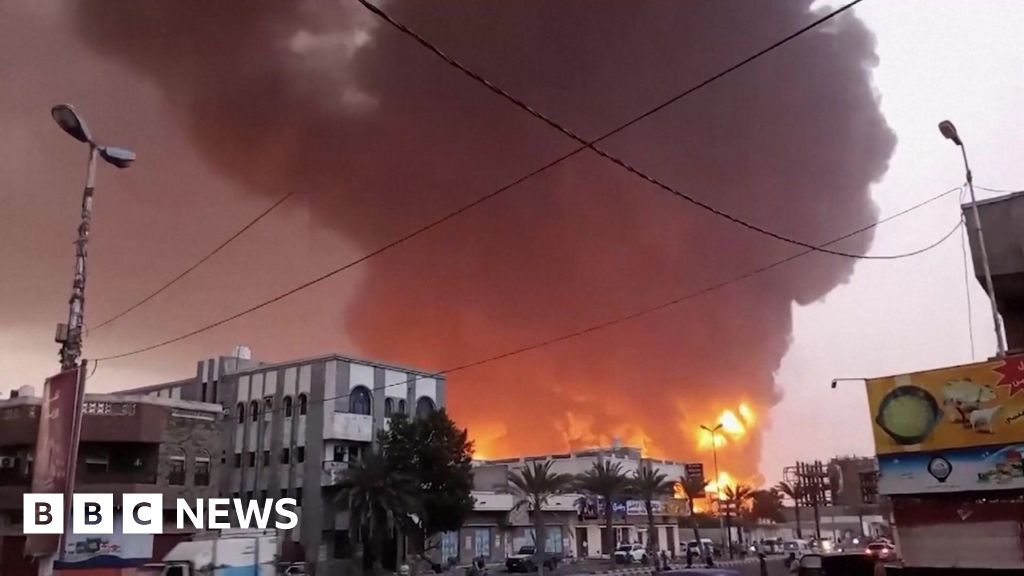Israel has carried out air strikes on the Houthi-controlled Red Sea port of Hodeidah in Yemen, a day after a drone launched by the group hit Tel Aviv.
Defence Minister Yoav Gallant said his country aimed to send a message to the Houthi movement.
“The fire that is currently burning in Hodeidah, is seen across the Middle East and the significance is clear,” he said.
Houthi-linked news outlets said three people were killed and more than 80 injured in Saturday’s strikes, in what Houthi official Mohammed Abdulsalam said was a “brutal Israel aggression against Yemen”.
On Sunday morning, the Israeli military said it had shot down a missile fired from Yemen before it crossed into Israel’s air space.
It added that air sirens had been activated in Israel’s Red Sea port of Eilat “following the possibility of falling shrapnel”.
Mr Abdulsalam said that the Israeli strikes were aimed at pressuring the Houthis to stop supporting the Palestinians in Gaza, something he said would not happen.
It is the first time Israel has responded directly to what it says have been hundreds of Yemeni drone and missile attacks aimed at its territory in recent months.
Footage from Hodeidah showed huge fires raging on Saturday evening. The Houthi-run government in Sanaa said Israel struck oil storage facilities close to the shore, as well as a nearby power plant.
In a statement, the Israel Defense Forces (IDF) said: “After nine months of continuous aerial attacks by the Houthis in Yemen toward Israel, IAF [Israeli Air Force] fighter jets conducted an extensive operational strike over 1,800km [1,118 miles) away against Houthi terrorist military targets” in the area of the port of Hodeidah.
“The IDF is capable of operating anywhere required and will strike any force that endangers Israelis,” the statement said, adding that Saturday’s operation was codenamed Outstretched Arm.
Mr Gallant said the Israeli jets had struck the group because they had harmed Israelis.
“The Houthis attacked us over 200 times. The first time that they harmed an Israeli citizen, we struck them. And we will do this in any place where it may be required,” he said.
Speaking on Saturday evening after the attacks, Israel’s Prime Minister Benjamin Netanyahu said his country would defend itself “by all means”.
“Anyone who harms us will pay a very heavy price for their aggression,” he said in a televised address, claiming the port was an entry point for Iranian weapons.
He also said it showed Israel’s enemies there was no place it could not reach.
On Friday a block of flats in Tel Aviv was hit by what an Israeli military official said was an Iranian-made unmanned aerial vehicle (UAV), which had been modified to fly long distance.
The Houthis said it carried out that attack, and vowed to stage more.
The attack killed a 50-year-old man who had recently moved to Israel from Belarus and injured eight others.
The Israeli military official said its defence forces had detected the incoming drone but had not tried to shoot it down because of “human error”.
Previously, almost all Houthi missiles and drones fired towards Israel had been intercepted and none were known to have reached Tel Aviv.
The Houthi Supreme Political Council, the movement’s executive body, was quoted by Houthi-run media on Saturday evening saying that there would be an “effective response” to the airstrikes.
Although Israel has not struck the Houthis in Yemen before, the US and UK have been launching air strikes against the group for months to try to stop the Houthis from attacking commercial shipping in the Gulf of Aden and the Red Sea.
The Houthis initially said they were attacking ships connected with Israel, or heading to or from there. However, many of the vessels have no connection with Israel and since air strikes began the group has also targeted vessels linked to the UK and US.





















Discussion about this post